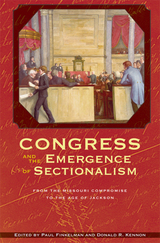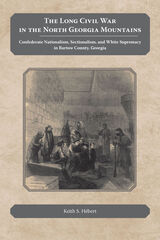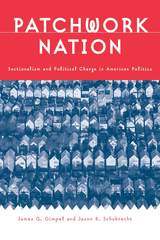
In 1815 the United States was a proud and confident nation. Its second war with England had come to a successful conclusion, and Americans seemed united as never before. The collapse of the Federalist party left the Jeffersonian Republicans in control of virtually all important governmental offices. This period of harmony—what historians once called the Era of Good Feeling—was not illusory, but it was far from stable. One-party government could not persist for long in a vibrant democracy full of ambitious politicians, and sectional harmony was possible only as long as no one addressed the hard issues: slavery, race, western expansion, and economic development.
Congress and the Emergence of Sectionalism: From the Missouri Compromise to the Age of Jackson inaugurates a new series for the United States Capitol Historical Society, one that will focus on issues that led to the secession crisis and the Civil War. This first volume examines controversies surrounding sectionalism and the rise of Jacksonian Democracy, placing these sources of conflict in the context of congressional action in the 1820s and 1830s. The essays in this volume consider the plight of American Indians, sectional strife over banking and commerce, emerging issues involving slavery, and the very nature of American democracy.
“It is to be regretted that the rich and powerful too often bend the acts of government to their selfish purposes…. There are no necessary evils in government. Its evils exist only in its abuses. If it would confine itself to equal protection, and, as Heaven does its rains, shower its favors alike on the high and the low, the rich and the poor, it would be an unqualified blessing. In the act before me there seems to be a wide and unnecessary departure from these just principles.”—Andrew Jackson, Veto Message Regarding the Bank of the United States, July 10, 1832
“I consider, then, the power to annul a law of the United States, assumed by one State, incompatible with the existence of the Union, contradicted expressly by the letter of the Constitution, unauthorized by its spirit, inconsistent with every principle on which it was founded, and destructive of the great object for which it was formed.”—Andrew Jackson, Proclamation Regarding Nullification to the People of South Carolina, December 10, 1832

Civil War historians have long noted that support for the Confederacy in the antebellum South tended to align with geography: those who lived in towns, along railroads, and on land suited for large-scale farming tended to side with the Confederacy, while those who lived a more isolated existence and made their livings by subsistence farming and bartering usually remained Unionist. Bartow County in northwest Georgia, with its distinctive terrain of valley, piedmont, and Appalachian hill country, is an ideal microcosm to examine these issues.
Keith S. Hébert examines the rise and precipitous fall of Confederate nationalism in Bartow County, a shared experience among many counties in the upland South. Hébert’s story tells us much about the war’s origins, Confederate defeat, and the enduring legacy of white supremacy in these rural areas. Although no major battles were fought in Bartow County, Sherman’s Atlanta Campaign saw Federal troops occupying the area, testing the loyalties of Bartow County soldiers serving in the Army of Tennessee and elsewhere. As the home front collapsed, they had to decide if they should remain in the army and fight or return home to protect their families and property. Locals hardly knew whom to trust as Unionists and Confederates—from both home and afar—engaged in guerilla warfare, stole resources from citizens, and made the war a confusing trap rather than a struggle for an emergent nation.
Drawing on the primary source record of newspapers, letters, diaries, and official documents from the county, Hébert compellingly works personalized vignettes into a scholarly study of developments from the advent of war through Reconstruction and the decades following. The Long Civil War in the North Georgia Mountains solidifies recent scholarship about the war in southern Appalachia and opens a window into a community deeply divided by civil war.

READERS
Browse our collection.
PUBLISHERS
See BiblioVault's publisher services.
STUDENT SERVICES
Files for college accessibility offices.
UChicago Accessibility Resources
home | accessibility | search | about | contact us
BiblioVault ® 2001 - 2024
The University of Chicago Press









